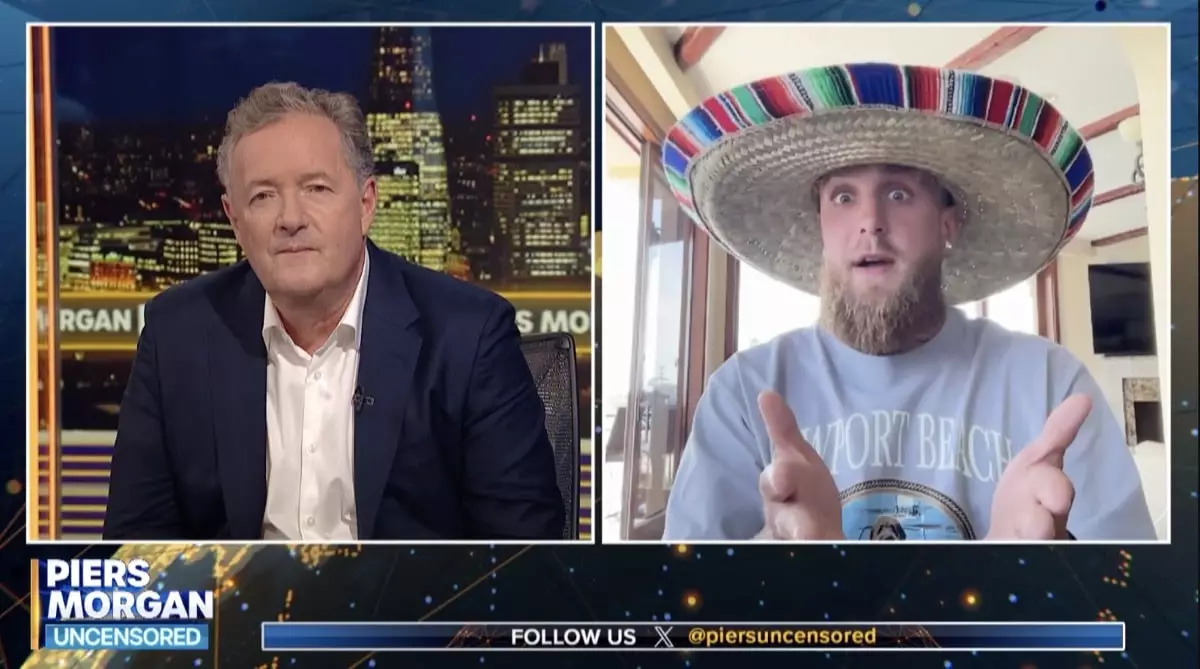In a recent episode of *Piers Morgan Uncensored*, digital provocateur Jake Paul displayed his signature bravado during a heated back-and-forth with Morgan. Set against the backdrop of Paul’s upcoming fight with Julio Cesar Chavez Jr., the interview quickly escalated from casual banter to a full-blown confrontation. Dressed in a Mexican sombrero, a nod to his opponent’s heritage, Paul seemed to utilize humor as armor, yet it was clear that tension simmered just beneath the surface.
The discussion took a sharp turn when Morgan challenged Paul on his boxing credibility, questioning the legitimacy of his past opponents and whether he belonged in the ring, especially against someone like Mike Tyson. Little did Morgan foresee, however, that his probing would trigger Paul’s explosive reaction. Ultimately, his seven-minute appearance concluded with Paul storming off, marking yet another episode in his saga of contentious public engagements. The optics were striking; a YouTuber attempting to establish himself in the age-old sport of boxing was publicly grappling with a renowned journalist who is often as much a target as a commentator.
Piers Morgan’s Questioning: Validity vs. Provocation
Morgan’s role as the provocateur was not without its objective merit. His skepticism about Paul’s contention that he could compete with fighters of Tyson’s caliber plays into a broader narrative: Can a figure whose roots stem from social media really claim to be a professional boxer? While Morgan acknowledged Paul’s prowess as a businessman, he didn’t shy away from reminding the audience that Paul’s most significant boxing feat remains a loss to Tommy Fury—a fact Paul vehemently challenged.
This line of questioning raises a crucial point; what delineates a “real” boxer in the modern sport? Should victories over celebrity opponents—like those racked up by Paul—count as legitimate accomplishments? Or are they merely stunts designed to attract attention? Both Morgan and Paul grapple with an identity crisis for the boxing community, where traditional values clash with new-age interpretations driven by entertainment. Paul has found himself in a unique position: He epitomizes the blend of sport and spectacle that today’s audiences crave.
The Fallout: Impulsiveness or Strategic Retreat?
Paul’s decision to walk off in frustration could be seen as both impulsive and strategically sound. On one hand, it showcased his inability to engage meaningfully under pressure, further complicating his image as a serious contender. On the other hand, it served to amplify the drama surrounding him—a hallmark of his branding strategy. After all, conflict drives engagement, and by walking away, Paul ensured that the conversation would continue long after the interview.
His assertion that he is “a real killer” in the ring indicates a deeper psychological struggle; can self-belief alone fuel an athlete’s success? This kind of bravado can be polarizing, appealing to fans who revel in conflict while alienating those who view it as brash and unsophisticated. In a sport where respect often hinges on humility and history, how far can Paul ride his self-created narrative before it unravels?
Implications of Celebrity in Boxing
The interaction between Paul and Morgan reflects a larger phenomenon in sports, where celebrity essentially shapes prestige. Traditional fighters like Canelo Alvarez and Terence Crawford appear to dismiss Paul’s ventures as gimmicks, a sentiment echoed through their comments during Morgan’s show. This skepticism toward celebrity rumbles in the boxing community, often manifesting in condescension toward those who presume to enter the ring with little foundational respect for its heritage.
As Paul prepares to face Chavez Jr., the stakes feel markedly elevated. He has not only to prove his worth as a fighter but also to challenge the narrative that surrounds him. When he refers to fellow fighters as “old heads” or “little peons,” it signals both disrespect and a hunger to destabilize the current state of boxing. But does this approach help or hinder his quest for legitimacy? Is he invigorating the sport or simply creating a rift?
The boxing world is certainly abuzz as fans and critics alike brace for the eventual showdown. Paul’s journey has illuminated the tension between legacy and modernity, spectacle and substance. The outcome will likely determine not just his future but the reception of influencer culture in the boxing ring. Whether the audiences will fully embrace this fusion of entertainment and athletics remains to be seen, but one thing is certain: Jake Paul’s impact on the sport will not soon be forgotten.

